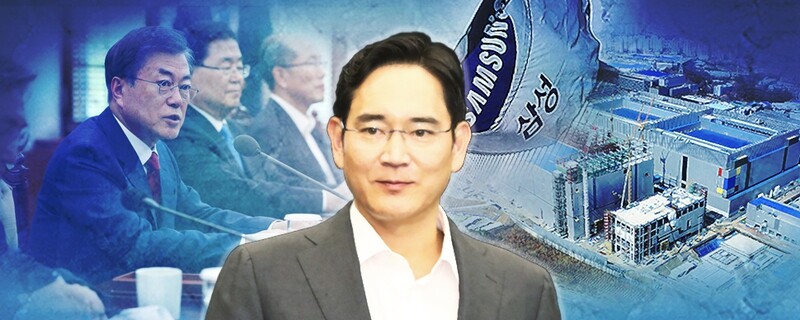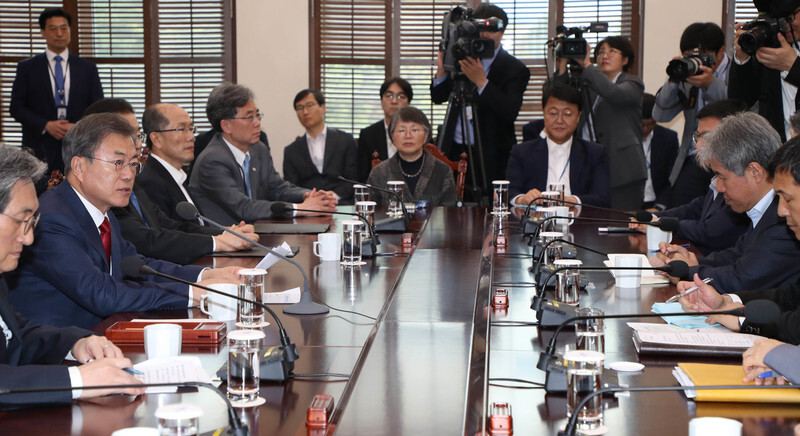hankyoreh
Links to other country sites 다른 나라 사이트 링크
Samsung and Moon admin. team up to bolster non-memory semiconductors

Samsung Electronics has joined forces with the South Korean government, under President Moon Jae-in, in the area of non-memory semiconductors. As the economy falters, the government is under fire for its lack of preparation in industrial policy, while Samsung is also being forced to shift its focus to the non-memory sector given the stagnation in the memory semiconductor market. These circumstances are expected to be evident during a briefing about vision and strategy for system semiconductors that will be jointly held by the government and Samsung on Apr. 30. The timing is quite peculiar – in May, the Supreme Court is expected to issue its verdict in the trial of Samsung Electronics Vice Chairman Lee Jae-yong on charges of embezzlement and bribery.
During the event, held at a Samsung Electronics plant in Hwaseong, the government will be announcing a program to support the non-memory semiconductor industry and celebrating the launch of Samsung’s applications processors (AP), which are produced here through a technique involving a 7-nanometer process involving extreme ultraviolet (EUV) waves. A range of leading figures in the semiconductor industry – including Lee Jae-yong himself and SK Hynix CEO Lee Seok-hee – will be present at the event, alongside government officials. The government is expected to unveil a master plan for promoting the non-memory semiconductor industry, with a focus on Samsung Electronics.
The Moon administration and Samsung’s “give and take” campaign for non-memory semiconductors got underway this past January. “We need to work on strengthening the competitiveness of system semiconductors,” said Lee Jae-yong during a visit to Samsung Electronics’ Giheung plant on Jan. 4. When Prime Minister Lee Nak-yeon paid a visit to the company’s Suwon plant on Jan. 10, Lee Jae-yong told him, “We’re going to get good results from system semiconductors.” When Moon asked Lee Jae-yong about his commitment to the non-memory sector during a meeting with businesspeople at the Blue House on Jan. 15, Lee replied by emphasizing that this was a “new attempt.” After Moon called for a “plan to mitigate the overemphasis on memory semiconductors by enhancing the competitiveness of the non-memory sector” during a cabinet meeting on Mar. 19, the government selected non-memory, biotech, and automobiles of the future as three industries on which government support should focus on Apr. 22. On Apr. 24, two days later, Samsung Electronics followed suit by releasing “Semiconductor Vision 2030,” in which it committed to “invest 133 trillion won (US$114.27 billion) in non-memory semiconductors by 2030.”
During a meeting of Blue House senior secretaries and advisors on Apr. 29, Moon announced a plan to prioritize support for the three industries for focused development and said that “Samsung’s announcement of its plan to invest 133 trillion won in system semiconductors is very welcome news for the national economy.” Direct references to Samsung have become more noticeable.

Samsung Electronics currently relies on memory semiconductors for 80% of business
Samsung Electronics’ move to foster its non-memory business is regarded as an unavoidable choice. The plunging demand and prices of memory semiconductors have delivered a heavy blow to Samsung Electronics, which relies on memory semiconductors for 80% of its business. In contrast, Intel, the world’s leading company in the non-memory sector, is expected to be the best-performing semiconductor firm in the first quarter of this year. As it happens, Samsung Electronics’ first quarter performance will be released on Apr. 30, the same day that the company and the government announced their non-memory objectives. Considering that semiconductors account for 20% of South Korea’s exports, a slump in Samsung’s performance could weaken the South Korean economy as a whole.
Some are concerned that the government is rushing too quickly to promote this initiative. “The transition to the non-memory industry is something that experts have been emphasizing for more than a decade. The plan to invest 1 trillion won (US$859.18 million) in R&D in the non-memory semiconductor sector finally passed on Apr. 25, after several preliminary feasibility studies. You could say that the government has waited too long, and is now in too much of a rush,” said Kim Hyeong-jun, a professor of material engineering at Seoul National University.
Holding event close to Supreme Court ruling provokes criticism of government pressure
There’s also considerable criticism about the timing of the announcement. The legal community expects that the Supreme Court’s ruling about Lee’s attempts to assume the reins of management at the Samsung Group will appear sometime in May. While Lee was sentenced to prison by a district court, he was released in February 2018 by an appeals court that gave him a suspended sentence.
“Holding this event shortly before the Supreme Court makes its decision will obviously provoke criticism that the government is exerting pressure on the Supreme Court, and the big problem is that the government is going ahead with this event anyway. The government’s and Lee’s interests coincide here: the government needs to show it’s doing something in an economic downturn, and Lee intends to take advantage of this opportunity with the hope of receiving a favorable ruling,” said Park Sang-in, a professor at the Graduate School of Public Administration at Seoul National University.
Some are also seeing the emphasis on Samsung in the government’s new policy framework as a “shift from income-led growth to a strategy of chaebol-dependent growth.” A member of the ruling party refuted that accusation as follows: “We’re taking interest in a new growth dynamo, but there’s no improper relationship between government and big business here. Industrial policy is being handled separately from the campaign to eradicate outdated and inappropriate practices.”
In October 2009, which marked the 40th anniversary of the establishment of Samsung Electronics, the company announced “Vision 2020.” Samsung Electronics Chairman Lee Kun-hee, who was pardoned on Dec. 31, 2009, by then President Lee Myung-bak, announced a plan to promote five future growth industries in May 2010. Lee Jae-yong released “Semiconductor Vision 2030” recently, with the Supreme Court about to release its verdict.
By Song Gyung-hwa, staff reporter
Please direct comments or questions to [english@hani.co.kr]

Editorial・opinion
![[Guest essay] Preventing Korean Peninsula from becoming front line of new cold war [Guest essay] Preventing Korean Peninsula from becoming front line of new cold war](https://flexible.img.hani.co.kr/flexible/normal/500/300/imgdb/original/2024/0507/7217150679227807.jpg) [Guest essay] Preventing Korean Peninsula from becoming front line of new cold war
[Guest essay] Preventing Korean Peninsula from becoming front line of new cold war![[Column] The state is back — but is it in business? [Column] The state is back — but is it in business?](https://flexible.img.hani.co.kr/flexible/normal/500/300/imgdb/original/2024/0506/8217149564092725.jpg) [Column] The state is back — but is it in business?
[Column] The state is back — but is it in business?- [Column] Life on our Trisolaris
- [Editorial] Penalties for airing allegations against Korea’s first lady endanger free press
- [Editorial] Yoon must halt procurement of SM-3 interceptor missiles
- [Guest essay] Maybe Korea’s rapid population decline is an opportunity, not a crisis
- [Column] Can Yoon steer diplomacy with Russia, China back on track?
- [Column] Season 2 of special prosecutor probe may be coming to Korea soon
- [Column] Park Geun-hye déjà vu in Yoon Suk-yeol
- [Editorial] New weight of N. Korea’s nuclear threats makes dialogue all the more urgent
Most viewed articles
- 1Behind-the-times gender change regulations leave trans Koreans in the lurch
- 2South Korean ambassador attends Putin’s inauguration as US and others boycott
- 3Family that exposed military cover-up of loved one’s death reflect on Marine’s death
- 4Yoon’s broken-compass diplomacy is steering Korea into serving US, Japanese interests
- 5Yoon’s revival of civil affairs senior secretary criticized as shield against judicial scrutiny
- 6Marines who survived flood that killed colleague urge president to OK special counsel probe
- 7AI is catching up with humans at a ‘shocking’ rate
- 8Japan says its directives were aimed at increasing Line’s security, not pushing Naver buyout
- 9[Guest essay] Preventing Korean Peninsula from becoming front line of new cold war
- 101 in 10 marriages in Korea last year was with a foreign national